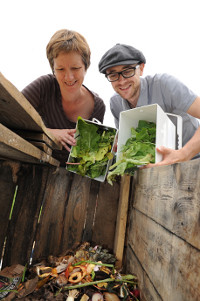Help
Community21 has selected some case study communities and projects to share across the network to inspire and inform others. Should we be featuring yours? If so get in touch.

Composting is the process of turning vegetable matter or manure into compost. The answer to dealing to with organic waste in the most natural way is composting which can also help grow healthy plants by improving quality of the soil. Organic waste can contribute to up to 30% of household waste and if disposed in landfill then it can create strong greenhouse gases. Community composting is a great solution for cities as in the city centre many people do not have enough or any space to compost so it is much harder to dispose of organic waste naturally. Community composting involves a central point which is made accessible for the local residents to use where they can compost their fruit and vegetable waste.
Brighton and Hove City Council have been working with numerous community associations including community garden groups and ‘The Brighton and Hove Food Partnership since August 2011 in order to develop the community composting schemes. So far the schemes have been very successful and effective and are set up in various locations throughout Brighton including: Brighton University Falmer Campus, London Road community garden and Hollingbury Library. Overall in one year with all of the schemes combined, by community composting a massive 50 tonnes of food waste (based on the idea that 15% of household waste is compostable) can be diverted from disposal. This is equivalent of the weight of 4 double decker buses and the schemes combined helps 600 homes compost their waste.
The local residents lead the scheme alongside support from Brighton and Hove City Council and Brighton and Brighton and Hove Food Partnership. There is training offered on looking after the bin and the turning and removing of the compost will be completed by the compost group members.
This contributes to environmental citizenship as the scheme obviously brings environmental benefits to the area but also has significant social benefits as by helping to bring the local residents together with other community organisations and different groups it creates community cohesion. It also contributes to the development towards zero waste and low carbon communities.
http://www.brighton-hove.gov.uk/content/environment/recycling-rubbish-and-street-cleaning/community-composting